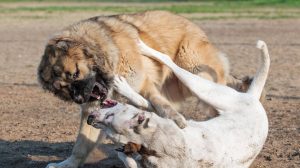The Rhodesian Ridgeback is a large, proud dog with a gentle nature. Therefore, his upbringing requires consistency and sensitivity and is only conditionally suitable for beginners.

Anyone considering getting a Rhodesian Ridgeback should remember that this dog was originally a hunting dog. Today it is rarely used for hunting and is often kept as a companion dog, but the hunting instinct is still there. In addition, the beautiful four-legged friend is considered loyal, intelligent and independent. He needs a lot of exercise and activity. Otherwise, he suffers from boredom and can develop behavioural problems.
The nature of the Rhodesian Ridgeback
Dogs of this breed usually present themselves as confident and brave. They are quick learners and are loyal and reliable to their caregivers. Despite their close bond with their caregiver, they are often reserved with strangers. With its intelligence and endurance, the Rhodesian Ridgeback is enthusiastic about almost every dog sport, for example, agility. But he also likes to jog or ride a bike. He is also said to be quite sensitive and stubborn. He’s not usually anxious or nervous.
He is not only persistent but also agile and brave. The dog breed once needed these qualities in Africa to hunt lions and other large game. Protective instinct and vigilance are also among the advantages of the active four-legged friend. How his character develops over time is, above all, a question of his upbringing. This applies particularly to young representatives of this breed: The Rhodesian Ridgeback is a late developer – it is only considered an adult at the age of three. As a young dog, he is an absolute whirlwind bursting with energy but tends to be a bit cocky.
Education of the big dog with the eel line
A Rhodesian Ridgeback with a good, consistent, and dog-friendly upbringing makes a loyal companion with an endearing and calm personality. If you are careless or undecided about parenting, that is just as bad for you as a hard hand. So be clear and consistent with the rules and commands and be patient and kind. Ridgebacks are usually eager to learn but lose interest when they feel forced or overwhelmed. So don’t be too authoritarian with your four-legged friend, avoid all aversive training methods, and use positive reinforcement rather than punishment.
Ideally, the prospective Ridgeback owner will be a dog connoisseur who has experience with hunting dogs and their specific needs. Anyone who trusts the training without such knowledge should seek advice from a dog trainer. Lots of exercise and varied activities contribute to the Rhodesian Ridgeback’s upbringing making it a gentle, good-natured and reliable partner.








